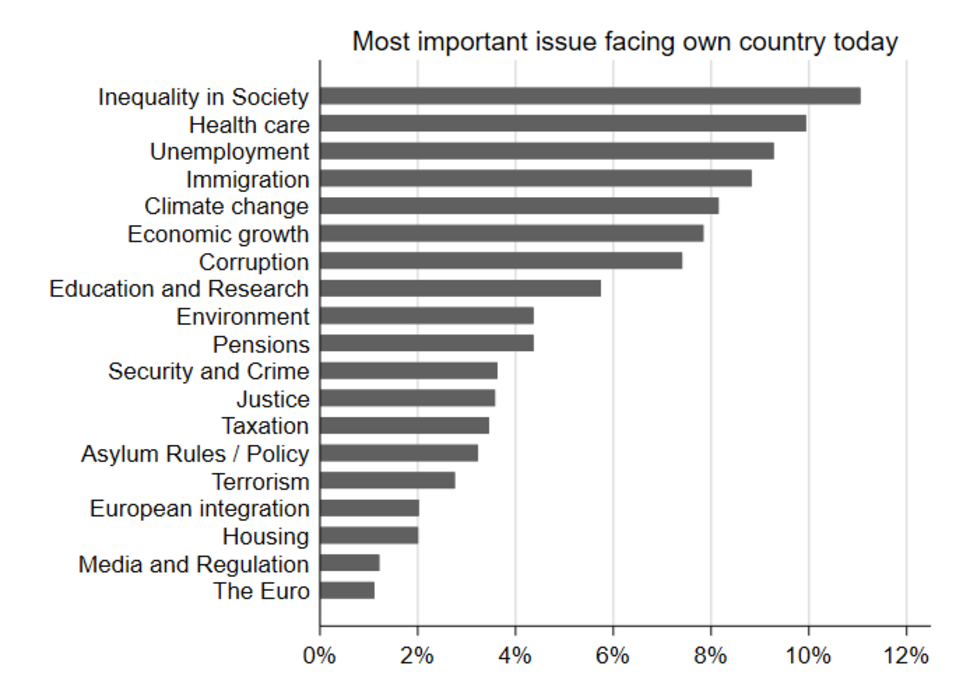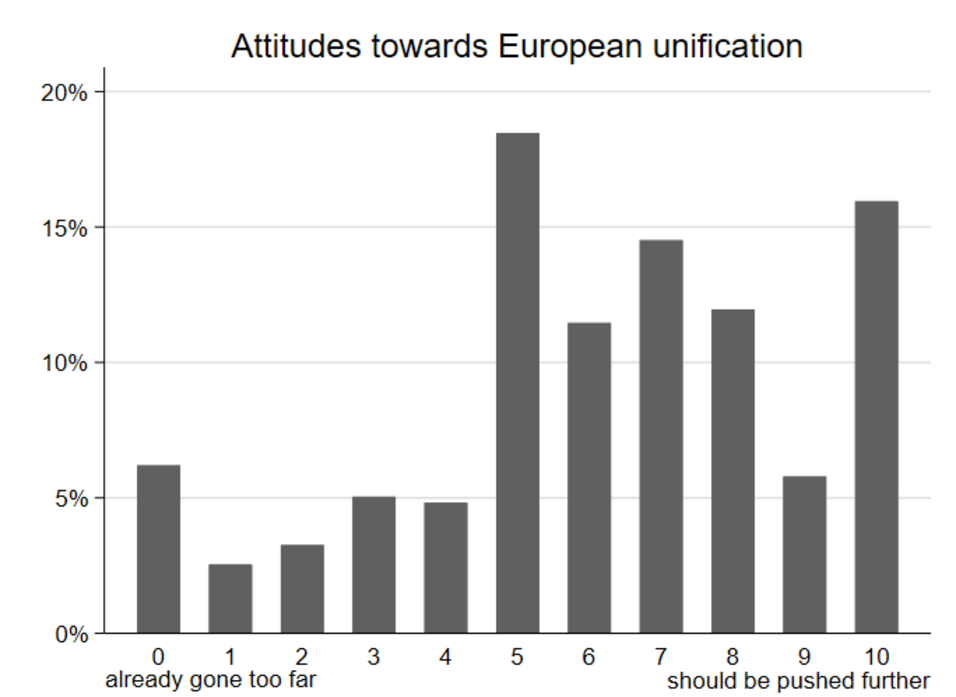by Sylvia Kritzinger, Carolina Plescia, James Wilhelm
Voter apathy?
A common denigration of European elections is that they fail to excite voters, who feel distant and detached from European politics. As such – so the standard view goes – voters tend to simply use European elections as a means to punish national governments, with Eurosceptic parties tending to profit (as anti-EU parties tend to be part of the opposition).
While it may be true that European elections lack the intensity of national contests, our survey reveals that European citizens are not as apathetic about the upcoming European Parliament election as this characterization would suggest. While 20% of our respondents disagreed with the statement “I have a good understanding of the important political issues facing the European Union (EU)”, a full 50% agreed that they understood the important issues, 11% of these strongly. About a third of respondents neither agreed nor disagreed with this statement.[1] Moreover, 39% of respondents expressed the view that they feel well qualified to participate in EU politics, while 28% said they did not feel this way. Thus, on balance, voters themselves do not feel incapable of participating in EU politics – though this is nevertheless the case for a minority of voters.
What about the impact that voters can have on the EU? More of our respondents (40%) than not (34%) disagreed with the statement that “People like me don’t have a say in what the EU does”. Meanwhile, more also disagreed (44%) than agreed (32%) with the statement “No matter whom I vote for, it won’t make a difference for the EU”. Thus, the data we collected in the pre-campaign period does not support the view that voters feel they cannot have any impact on EU politics. Though this is not universally the case, more often than not, the respondents we surveyed expressed the view that they do have a say and that their vote can make a difference.
The issues of importance to citizens
Concerning the issue priorities of voters, it has been widely reported that the upcoming European Parliament elections will be dominated by the issue of immigration, and this follows from the attention given to this topic by many Eurosceptic parties that have experienced a rise in vote share in recent polls and national election contests. However, our data shows that, at the voter level, issue priorities are more heterogeneous, suggesting that the election will likely be fought on a much wider range of issues than just immigration. In fact, of the 19 issues we asked our respondents about across our seven countries of study, inequality (11%) followed by health care (10%) and unemployment (9%) come out on top as the three most important issues, with immigration in fourth place (9%), and concerns about asylum rules and policy (3%) as thirteenth most important.[2] Though immigration and asylum rules and policy could arguably be collapsed together to create a single category, even then the point remains: European citizens are concerned about far more than just migration-related issues in the run-up to Election Day.
Our data also reveals noticeable heterogeneity between countries: while climate change tops the list of most important issues in Denmark (21%) and Germany (16%), healthcare is most important for the respondents we surveyed in Poland (20%) and Hungary (25%). Unemployment has highest priority in Spain (24%) and Italy (22%), and our French respondents care most about societal inequality (20%). Thus, our data suggests that European citizens are concerned about a diverse range of issues – not a single issue – in the run-up to Election Day, and no single story can capture the issue priorities of electorates across countries.
Citizens' disposition towards European integration
In the wake of Brexit and the increasing success of Eurosceptic parties in many national contests, there has been much talk of citizens falling out of love with the EU, and even the potential disintegration of the European Union. What light does our data shed on this debate? In each of our countries of study, we asked respondents what they thought about European unification, asking them to place themselves on a 0-10 scale, where 0 means that European unification has “already gone too far” and 10 that it should be “pushed further”.[3] A clear majority of respondents, 60%, express the view that European unification should be pushed further (i.e. placed themselves at 6 or above on the 0-10 scale), 22% feel it has already gone too far (i.e. selected 4 or below on the scale), and 18% say it has neither gone too far nor should be pushed further (i.e. placed themselves at the midpoint). Thus, out of tune with common conceptions of public opinion towards the European integration in the wake of multiple crises and the increased visibility of Eurosceptic parties, our data shows that the European electorate as a whole is in fact generally positive about the possibility of increased European cooperation.
We also asked respondents in each of our countries of study how they would vote in a hypothetical referendum on their country’s membership of the European Union.[4] In the aftermath of the vote in favour of Brexit, there has been much talk of other countries following suit. Our data shows that, of those who would vote in such a referendum, a large majority, 82%, would vote in favour of remaining a member state of the European Union – and there is no majority for leaving in any of our individual countries of study. Thus, our survey presents little evidence that there is an appetite at the citizen level for leaving the European Union altogether, despite the fear of Brexit ‘contagion’. These findings may be related to our respondents’ views about whether the UK is likely to be better or worse off outside of the European: 56% of our respondents said the UK is likely to be worse off and only 17% better off.[5]
The general view, pre-campaign
What does our data reveal overall? While it is certainly true that some feel like they do not understand and cannot have an impact on European politics, care about immigration above all other issues, and dislike the European project, this is far from universally true. In fact, on balance, the opposite seems to be better supported by the pre-campaign data we collected: citizens are generally positive about European integration, feel they understand EU politics to some extent and can make a difference through voting, and care about a diverse range of issues in the pre-election period.
In the second wave of our data collection project, taking place immediately after Election Day (May 23-26), we will return to survey the same respondents again, to check whether this outlook still holds after the election campaign is over.
Footnotes
[1] For each of the statements in this section, respondents were able to select between the answer options: Disagree strongly, Disagree somewhat, Neither agree nor disagree, Agree somewhat, Agree strongly. Agreement is defined as the selection of either “Agree strongly” or “Agree somewhat”, and disagreement “Disagree strongly” or “Disagree somewhat”.
[2] Question wording: “Now a question about the issues facing [country] today. Among the following, which do you think is the most important one? Please select one.” (Respondents presented the items listed in Figure 1).
[3] Question wording: “Some say European unification should be pushed further. Others say it already has gone too far. What is your opinion? Please indicate your views using a scale from 0 to 10, where ‘0’ means unification “has already gone too far” and ’10’ means it “should be pushed further”.”
[4] Question wording: “If there was a referendum about staying or leaving the EU in [country], how would you decide?” Respondents could select between: [country] staying in the EU, [country] leaving the EU, I am undecided, I would not vote.
[5] Question wording: “Considering Brexit, all in all, how do you see the United Kingdom’s future outside the European Union? Do you think the UK will be:” Respondents could select between: Much better off, Better off, No better or worse off, Worse off, Much worse off, Don’t know.
This blog post has also appeared in the RECONNECT Blog.
Professor Sylvia Kritzinger (principal investigator) is an expert in political and electoral behaviour (including local, national and European elections), public opinion, including citizens’ perceptions of the trustworthiness and competence of the political institutions, and survey methodology. Dr. Carolina Plescia (principal investigator) is a specialist of electoral behaviour, survey methodology and analysis of large data sets. Dr. James Wilhelm (postdoc) is a specialist in the areas of public opinion, political psychology, voting behaviour, European studies, survey design and analysis, and experimental methods.




